Reflection Essay: Analyzing Technology's Influence on Tourism Sector
VerifiedAdded on 2020/06/06
|6
|1366
|170
Essay
AI Summary
This essay provides a reflection on the impact of technology on the tourism industry. The author explores various concepts, including Porter's Five Forces model, to analyze the effects of technology on industry rivalry, threats of substitutes, and the bargaining power of buyers and suppliers. The essay highlights how technological advancements, such as 3D images and multiple screen sharing, have fostered tourism development. It also examines the concepts of disintermediation, business models, and value chains, and how they have been influenced by technological changes. The author discusses the rise of online business, the impact of ICT on brand image, and the role of government in promoting tourism through technology. The essay concludes by acknowledging the benefits and increased competition brought about by these technological developments.
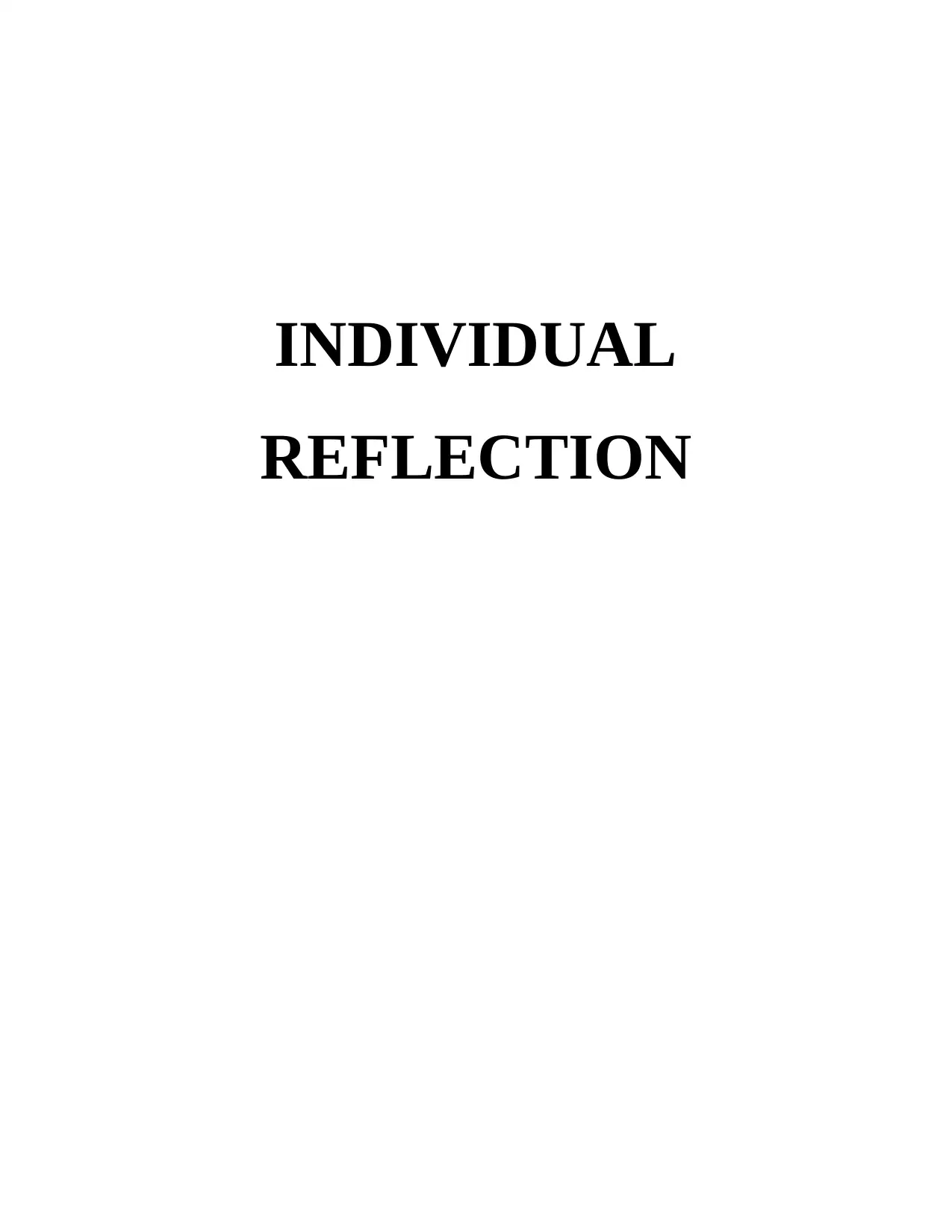
INDIVIDUAL
REFLECTION
REFLECTION
Paraphrase This Document
Need a fresh take? Get an instant paraphrase of this document with our AI Paraphraser

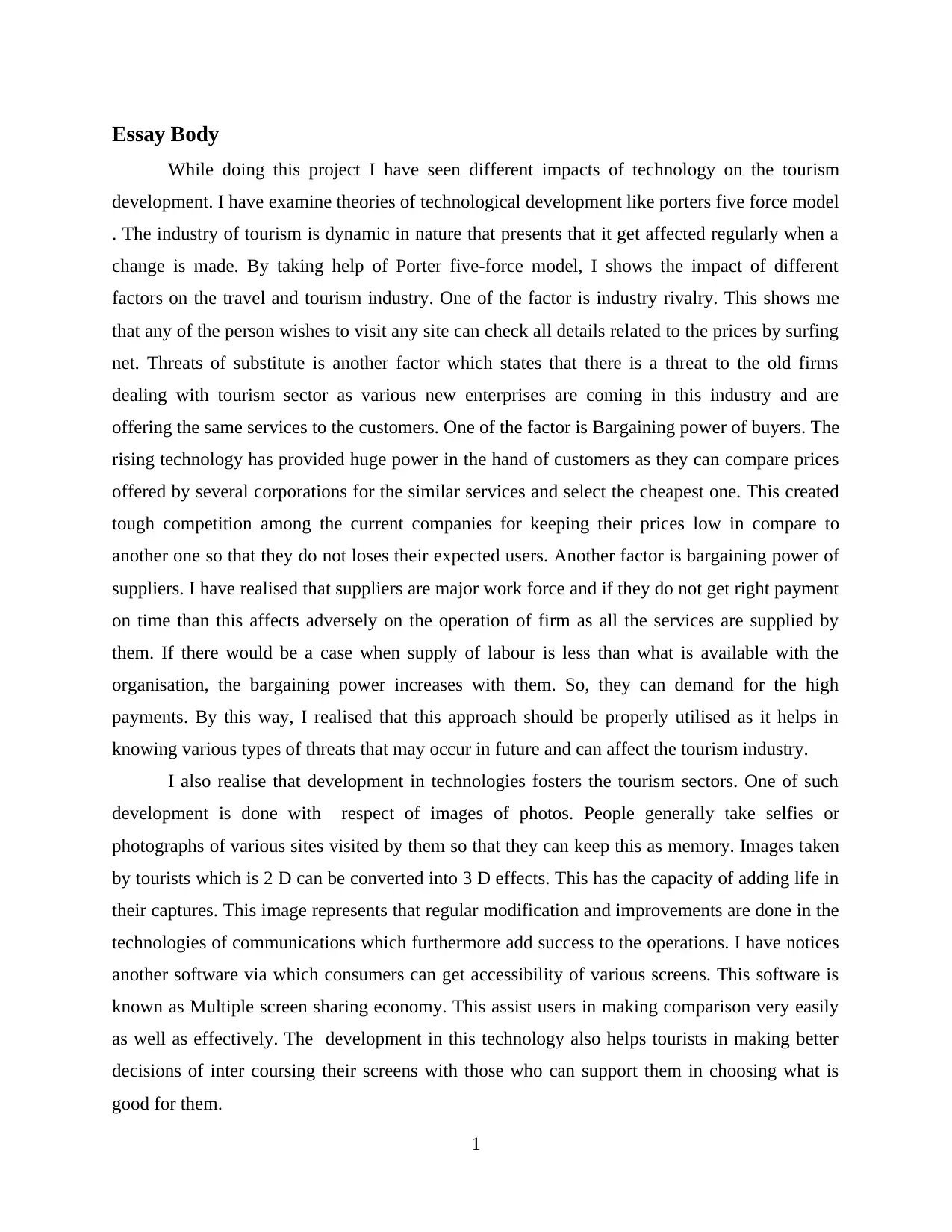
Essay Body
While doing this project I have seen different impacts of technology on the tourism
development. I have examine theories of technological development like porters five force model
. The industry of tourism is dynamic in nature that presents that it get affected regularly when a
change is made. By taking help of Porter five-force model, I shows the impact of different
factors on the travel and tourism industry. One of the factor is industry rivalry. This shows me
that any of the person wishes to visit any site can check all details related to the prices by surfing
net. Threats of substitute is another factor which states that there is a threat to the old firms
dealing with tourism sector as various new enterprises are coming in this industry and are
offering the same services to the customers. One of the factor is Bargaining power of buyers. The
rising technology has provided huge power in the hand of customers as they can compare prices
offered by several corporations for the similar services and select the cheapest one. This created
tough competition among the current companies for keeping their prices low in compare to
another one so that they do not loses their expected users. Another factor is bargaining power of
suppliers. I have realised that suppliers are major work force and if they do not get right payment
on time than this affects adversely on the operation of firm as all the services are supplied by
them. If there would be a case when supply of labour is less than what is available with the
organisation, the bargaining power increases with them. So, they can demand for the high
payments. By this way, I realised that this approach should be properly utilised as it helps in
knowing various types of threats that may occur in future and can affect the tourism industry.
I also realise that development in technologies fosters the tourism sectors. One of such
development is done with respect of images of photos. People generally take selfies or
photographs of various sites visited by them so that they can keep this as memory. Images taken
by tourists which is 2 D can be converted into 3 D effects. This has the capacity of adding life in
their captures. This image represents that regular modification and improvements are done in the
technologies of communications which furthermore add success to the operations. I have notices
another software via which consumers can get accessibility of various screens. This software is
known as Multiple screen sharing economy. This assist users in making comparison very easily
as well as effectively. The development in this technology also helps tourists in making better
decisions of inter coursing their screens with those who can support them in choosing what is
good for them.
1
While doing this project I have seen different impacts of technology on the tourism
development. I have examine theories of technological development like porters five force model
. The industry of tourism is dynamic in nature that presents that it get affected regularly when a
change is made. By taking help of Porter five-force model, I shows the impact of different
factors on the travel and tourism industry. One of the factor is industry rivalry. This shows me
that any of the person wishes to visit any site can check all details related to the prices by surfing
net. Threats of substitute is another factor which states that there is a threat to the old firms
dealing with tourism sector as various new enterprises are coming in this industry and are
offering the same services to the customers. One of the factor is Bargaining power of buyers. The
rising technology has provided huge power in the hand of customers as they can compare prices
offered by several corporations for the similar services and select the cheapest one. This created
tough competition among the current companies for keeping their prices low in compare to
another one so that they do not loses their expected users. Another factor is bargaining power of
suppliers. I have realised that suppliers are major work force and if they do not get right payment
on time than this affects adversely on the operation of firm as all the services are supplied by
them. If there would be a case when supply of labour is less than what is available with the
organisation, the bargaining power increases with them. So, they can demand for the high
payments. By this way, I realised that this approach should be properly utilised as it helps in
knowing various types of threats that may occur in future and can affect the tourism industry.
I also realise that development in technologies fosters the tourism sectors. One of such
development is done with respect of images of photos. People generally take selfies or
photographs of various sites visited by them so that they can keep this as memory. Images taken
by tourists which is 2 D can be converted into 3 D effects. This has the capacity of adding life in
their captures. This image represents that regular modification and improvements are done in the
technologies of communications which furthermore add success to the operations. I have notices
another software via which consumers can get accessibility of various screens. This software is
known as Multiple screen sharing economy. This assist users in making comparison very easily
as well as effectively. The development in this technology also helps tourists in making better
decisions of inter coursing their screens with those who can support them in choosing what is
good for them.
1
⊘ This is a preview!⊘
Do you want full access?
Subscribe today to unlock all pages.

Trusted by 1+ million students worldwide
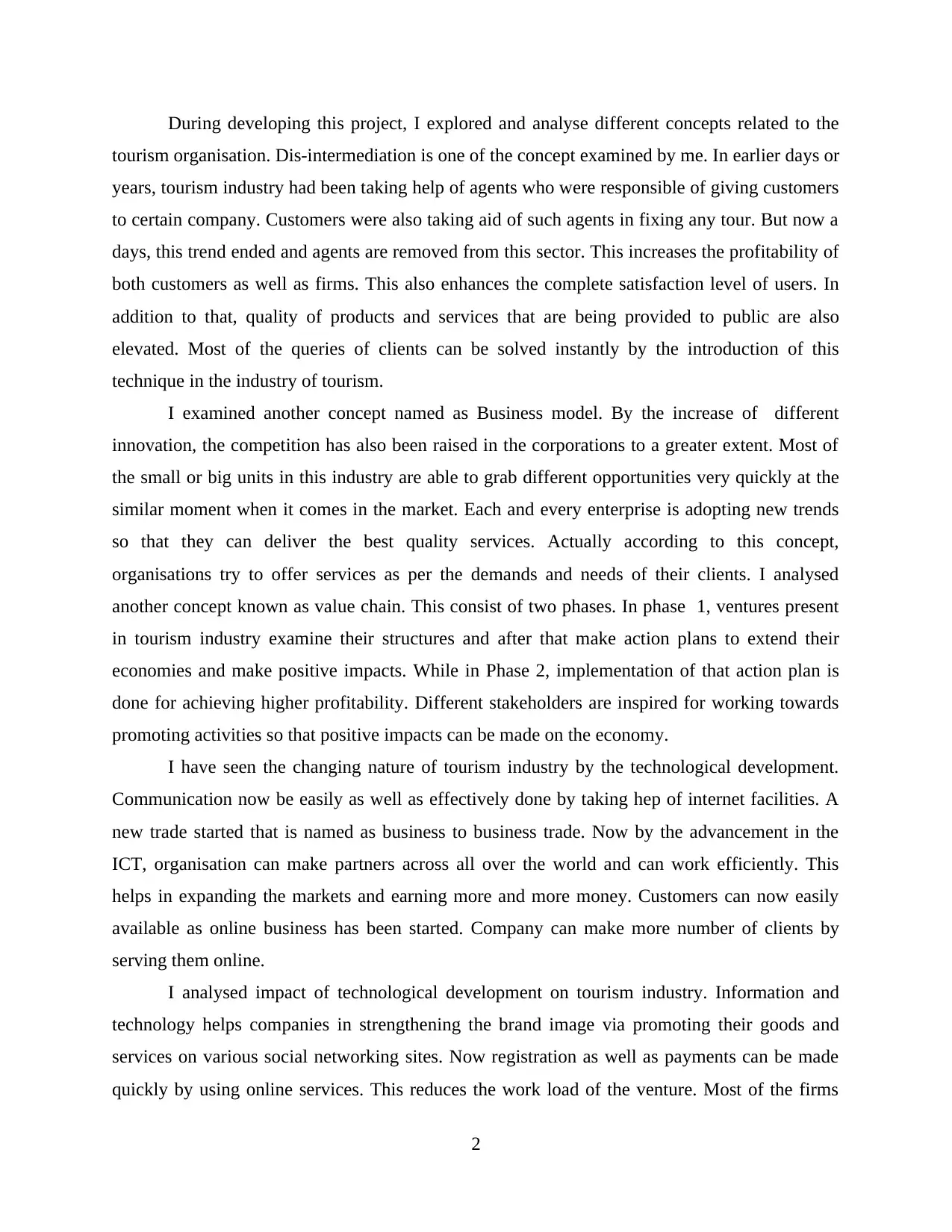
During developing this project, I explored and analyse different concepts related to the
tourism organisation. Dis-intermediation is one of the concept examined by me. In earlier days or
years, tourism industry had been taking help of agents who were responsible of giving customers
to certain company. Customers were also taking aid of such agents in fixing any tour. But now a
days, this trend ended and agents are removed from this sector. This increases the profitability of
both customers as well as firms. This also enhances the complete satisfaction level of users. In
addition to that, quality of products and services that are being provided to public are also
elevated. Most of the queries of clients can be solved instantly by the introduction of this
technique in the industry of tourism.
I examined another concept named as Business model. By the increase of different
innovation, the competition has also been raised in the corporations to a greater extent. Most of
the small or big units in this industry are able to grab different opportunities very quickly at the
similar moment when it comes in the market. Each and every enterprise is adopting new trends
so that they can deliver the best quality services. Actually according to this concept,
organisations try to offer services as per the demands and needs of their clients. I analysed
another concept known as value chain. This consist of two phases. In phase 1, ventures present
in tourism industry examine their structures and after that make action plans to extend their
economies and make positive impacts. While in Phase 2, implementation of that action plan is
done for achieving higher profitability. Different stakeholders are inspired for working towards
promoting activities so that positive impacts can be made on the economy.
I have seen the changing nature of tourism industry by the technological development.
Communication now be easily as well as effectively done by taking hep of internet facilities. A
new trade started that is named as business to business trade. Now by the advancement in the
ICT, organisation can make partners across all over the world and can work efficiently. This
helps in expanding the markets and earning more and more money. Customers can now easily
available as online business has been started. Company can make more number of clients by
serving them online.
I analysed impact of technological development on tourism industry. Information and
technology helps companies in strengthening the brand image via promoting their goods and
services on various social networking sites. Now registration as well as payments can be made
quickly by using online services. This reduces the work load of the venture. Most of the firms
2
tourism organisation. Dis-intermediation is one of the concept examined by me. In earlier days or
years, tourism industry had been taking help of agents who were responsible of giving customers
to certain company. Customers were also taking aid of such agents in fixing any tour. But now a
days, this trend ended and agents are removed from this sector. This increases the profitability of
both customers as well as firms. This also enhances the complete satisfaction level of users. In
addition to that, quality of products and services that are being provided to public are also
elevated. Most of the queries of clients can be solved instantly by the introduction of this
technique in the industry of tourism.
I examined another concept named as Business model. By the increase of different
innovation, the competition has also been raised in the corporations to a greater extent. Most of
the small or big units in this industry are able to grab different opportunities very quickly at the
similar moment when it comes in the market. Each and every enterprise is adopting new trends
so that they can deliver the best quality services. Actually according to this concept,
organisations try to offer services as per the demands and needs of their clients. I analysed
another concept known as value chain. This consist of two phases. In phase 1, ventures present
in tourism industry examine their structures and after that make action plans to extend their
economies and make positive impacts. While in Phase 2, implementation of that action plan is
done for achieving higher profitability. Different stakeholders are inspired for working towards
promoting activities so that positive impacts can be made on the economy.
I have seen the changing nature of tourism industry by the technological development.
Communication now be easily as well as effectively done by taking hep of internet facilities. A
new trade started that is named as business to business trade. Now by the advancement in the
ICT, organisation can make partners across all over the world and can work efficiently. This
helps in expanding the markets and earning more and more money. Customers can now easily
available as online business has been started. Company can make more number of clients by
serving them online.
I analysed impact of technological development on tourism industry. Information and
technology helps companies in strengthening the brand image via promoting their goods and
services on various social networking sites. Now registration as well as payments can be made
quickly by using online services. This reduces the work load of the venture. Most of the firms
2
Paraphrase This Document
Need a fresh take? Get an instant paraphrase of this document with our AI Paraphraser
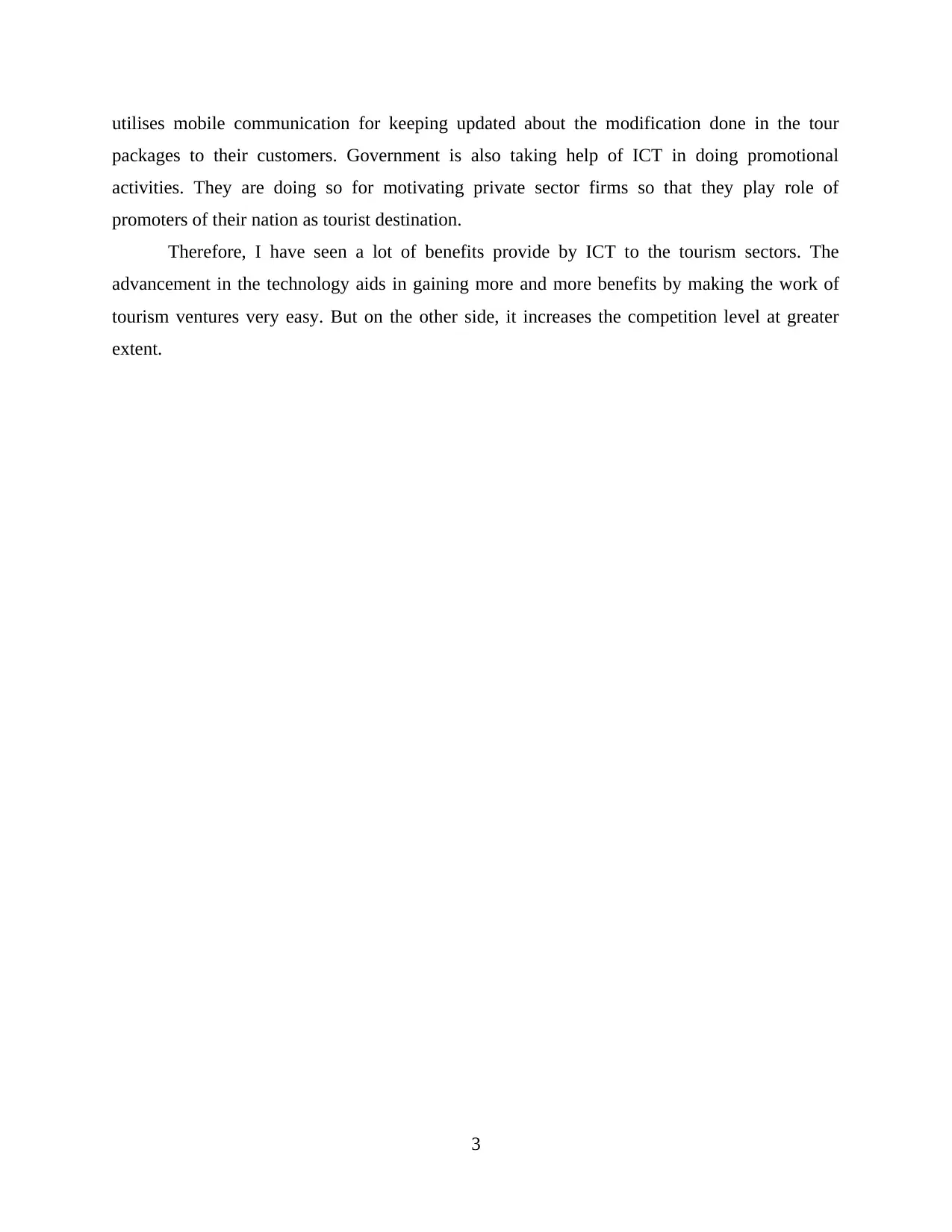
utilises mobile communication for keeping updated about the modification done in the tour
packages to their customers. Government is also taking help of ICT in doing promotional
activities. They are doing so for motivating private sector firms so that they play role of
promoters of their nation as tourist destination.
Therefore, I have seen a lot of benefits provide by ICT to the tourism sectors. The
advancement in the technology aids in gaining more and more benefits by making the work of
tourism ventures very easy. But on the other side, it increases the competition level at greater
extent.
3
packages to their customers. Government is also taking help of ICT in doing promotional
activities. They are doing so for motivating private sector firms so that they play role of
promoters of their nation as tourist destination.
Therefore, I have seen a lot of benefits provide by ICT to the tourism sectors. The
advancement in the technology aids in gaining more and more benefits by making the work of
tourism ventures very easy. But on the other side, it increases the competition level at greater
extent.
3
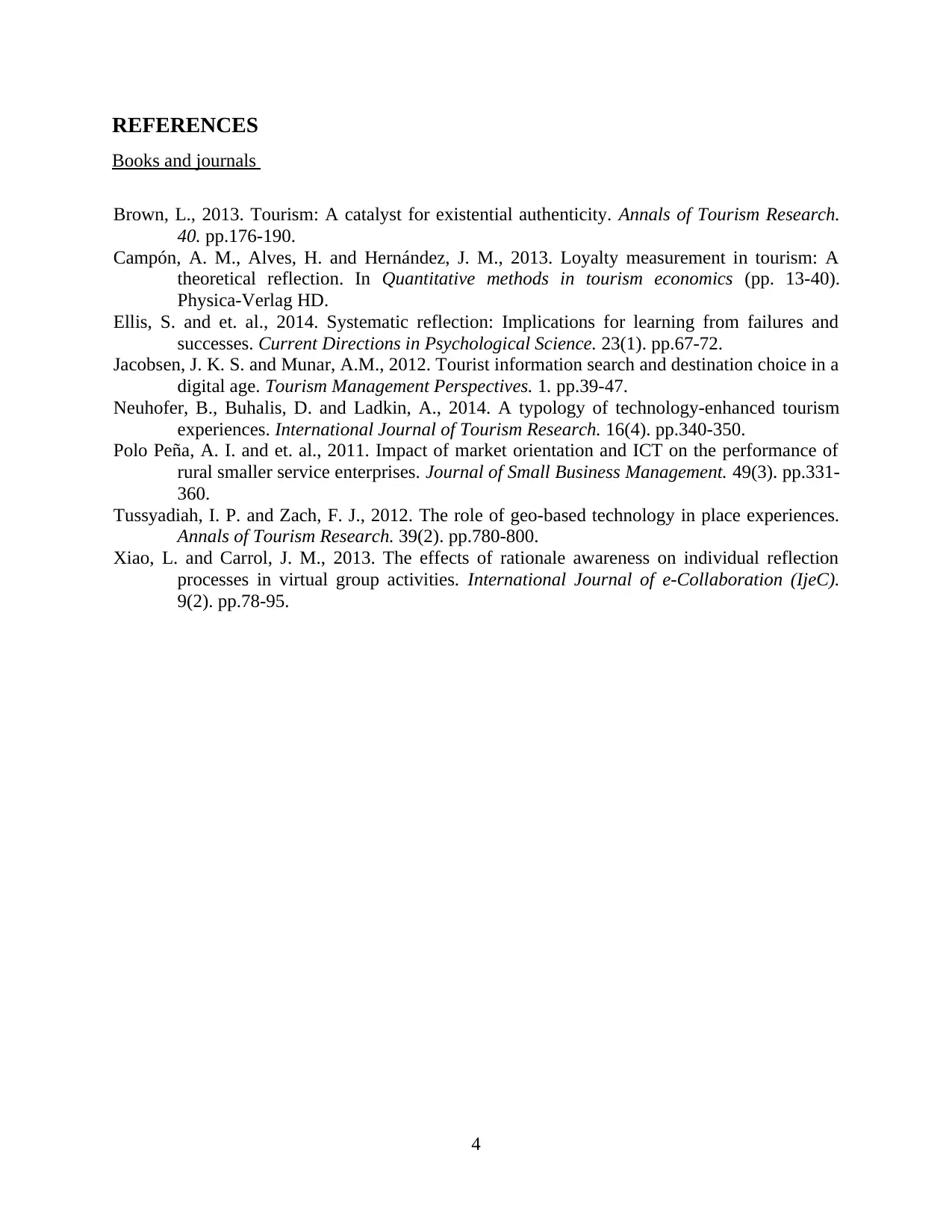
REFERENCES
Books and journals
Brown, L., 2013. Tourism: A catalyst for existential authenticity. Annals of Tourism Research.
40. pp.176-190.
Campón, A. M., Alves, H. and Hernández, J. M., 2013. Loyalty measurement in tourism: A
theoretical reflection. In Quantitative methods in tourism economics (pp. 13-40).
Physica-Verlag HD.
Ellis, S. and et. al., 2014. Systematic reflection: Implications for learning from failures and
successes. Current Directions in Psychological Science. 23(1). pp.67-72.
Jacobsen, J. K. S. and Munar, A.M., 2012. Tourist information search and destination choice in a
digital age. Tourism Management Perspectives. 1. pp.39-47.
Neuhofer, B., Buhalis, D. and Ladkin, A., 2014. A typology of technology‐enhanced tourism
experiences. International Journal of Tourism Research. 16(4). pp.340-350.
Polo Peña, A. I. and et. al., 2011. Impact of market orientation and ICT on the performance of
rural smaller service enterprises. Journal of Small Business Management. 49(3). pp.331-
360.
Tussyadiah, I. P. and Zach, F. J., 2012. The role of geo-based technology in place experiences.
Annals of Tourism Research. 39(2). pp.780-800.
Xiao, L. and Carrol, J. M., 2013. The effects of rationale awareness on individual reflection
processes in virtual group activities. International Journal of e-Collaboration (IjeC).
9(2). pp.78-95.
4
Books and journals
Brown, L., 2013. Tourism: A catalyst for existential authenticity. Annals of Tourism Research.
40. pp.176-190.
Campón, A. M., Alves, H. and Hernández, J. M., 2013. Loyalty measurement in tourism: A
theoretical reflection. In Quantitative methods in tourism economics (pp. 13-40).
Physica-Verlag HD.
Ellis, S. and et. al., 2014. Systematic reflection: Implications for learning from failures and
successes. Current Directions in Psychological Science. 23(1). pp.67-72.
Jacobsen, J. K. S. and Munar, A.M., 2012. Tourist information search and destination choice in a
digital age. Tourism Management Perspectives. 1. pp.39-47.
Neuhofer, B., Buhalis, D. and Ladkin, A., 2014. A typology of technology‐enhanced tourism
experiences. International Journal of Tourism Research. 16(4). pp.340-350.
Polo Peña, A. I. and et. al., 2011. Impact of market orientation and ICT on the performance of
rural smaller service enterprises. Journal of Small Business Management. 49(3). pp.331-
360.
Tussyadiah, I. P. and Zach, F. J., 2012. The role of geo-based technology in place experiences.
Annals of Tourism Research. 39(2). pp.780-800.
Xiao, L. and Carrol, J. M., 2013. The effects of rationale awareness on individual reflection
processes in virtual group activities. International Journal of e-Collaboration (IjeC).
9(2). pp.78-95.
4
⊘ This is a preview!⊘
Do you want full access?
Subscribe today to unlock all pages.

Trusted by 1+ million students worldwide
1 out of 6
Related Documents
Your All-in-One AI-Powered Toolkit for Academic Success.
+13062052269
info@desklib.com
Available 24*7 on WhatsApp / Email
![[object Object]](/_next/static/media/star-bottom.7253800d.svg)
Unlock your academic potential
Copyright © 2020–2026 A2Z Services. All Rights Reserved. Developed and managed by ZUCOL.




